Intro
Discover a comprehensive Colonoscopy Prep Guide, including bowel prep tips, colon cleanse methods, and dietary advice to ensure a successful procedure and accurate diagnosis, reducing colon cancer risks.
Colonoscopy is a vital medical procedure that helps doctors diagnose and prevent colon cancer, as well as detect other colon-related issues. The preparation process for a colonoscopy is crucial to ensure accurate results and a smooth procedure. In this article, we will delve into the importance of colonoscopy prep, its benefits, and provide a comprehensive guide on how to prepare for the procedure.
A colonoscopy is a procedure that allows doctors to visually examine the inside of the colon and rectum for abnormalities, such as polyps, cancer, and inflammation. The procedure involves inserting a flexible tube with a camera and light on the end into the rectum and guiding it through the colon. The preparation process for a colonoscopy typically starts a few days before the procedure and involves a combination of dietary changes, bowel cleansing, and medication.
The importance of proper colonoscopy prep cannot be overstated. A well-prepared colon allows doctors to get a clear view of the colon and rectum, increasing the chances of detecting any abnormalities. Additionally, proper prep reduces the risk of complications during the procedure and ensures that the procedure is completed efficiently.
Understanding the Colonoscopy Prep Process
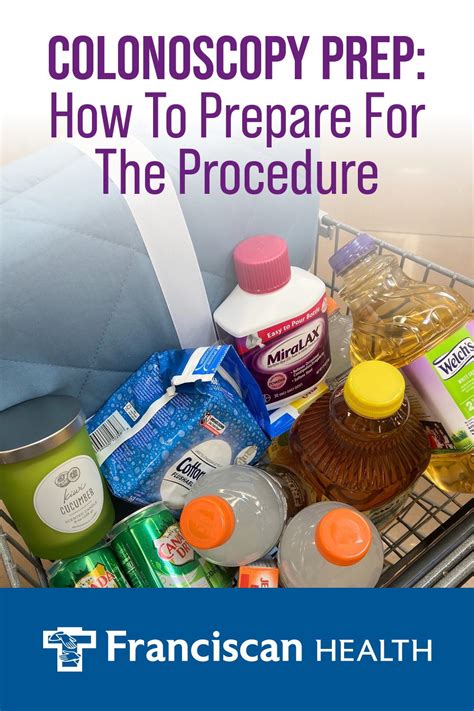
The colonoscopy prep process typically involves several steps, including dietary changes, bowel cleansing, and medication. The specific steps may vary depending on the doctor's instructions and the individual's medical history. Generally, the process starts a few days before the procedure, and patients are advised to follow a clear liquid diet, which includes foods such as broth, gelatin, and electrolyte-rich beverages.
Benefits of Proper Colonoscopy Prep
Proper colonoscopy prep has several benefits, including: * Increased accuracy of results * Reduced risk of complications during the procedure * Improved patient comfort during the procedure * Faster procedure time * Better detection of abnormalities, such as polyps and cancerStep-by-Step Guide to Colonoscopy Prep
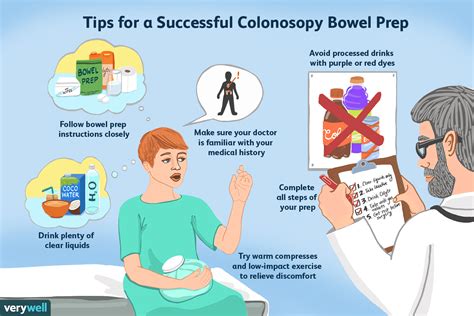
Here is a step-by-step guide to help you prepare for a colonoscopy:
- Dietary changes: Start following a clear liquid diet a few days before the procedure. Avoid solid foods, dairy products, and red or purple liquids.
- Bowel cleansing: Take a bowel prep medication as instructed by your doctor. This medication will help cleanse your colon and remove any stool.
- Medication: Take any prescribed medication as instructed by your doctor.
- Hydration: Drink plenty of clear liquids to stay hydrated and help the bowel prep medication work effectively.
- Avoid certain foods: Avoid eating foods that are high in fiber, such as beans, cabbage, and broccoli, as they can interfere with the bowel prep medication.
Common Colonoscopy Prep Medications
Some common colonoscopy prep medications include: * Polyethylene glycol (PEG) * Sodium phosphate * Magnesium citrate * BisacodylWhat to Expect During the Colonoscopy Procedure
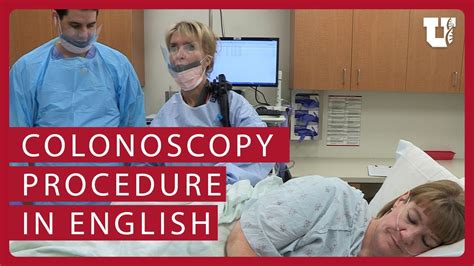
During the colonoscopy procedure, you will be asked to lie on your side or back on an examination table. The doctor will insert a flexible tube with a camera and light on the end into your rectum and guide it through your colon. The procedure typically takes 30-60 minutes to complete.
Risks and Complications of Colonoscopy
While colonoscopy is a safe procedure, there are some risks and complications to be aware of, including: * Bleeding * Perforation of the colon * Infection * Adverse reactions to the bowel prep medicationAfter the Colonoscopy Procedure
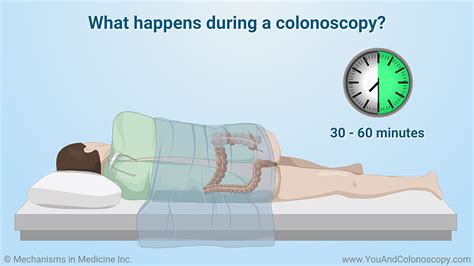
After the colonoscopy procedure, you will be taken to a recovery room where you will be monitored for any complications. You may experience some discomfort, bloating, or gas, but these symptoms should resolve on their own. Your doctor will discuss the results of the procedure with you and provide instructions on how to care for yourself after the procedure.
Follow-up Care
After the colonoscopy procedure, it is essential to follow up with your doctor to discuss the results and any further treatment or follow-up care that may be needed. Your doctor may recommend a follow-up colonoscopy in a few years to monitor your colon health.Conclusion and Next Steps
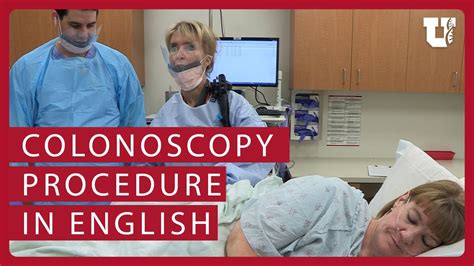
In conclusion, colonoscopy is a vital medical procedure that helps doctors diagnose and prevent colon cancer, as well as detect other colon-related issues. Proper colonoscopy prep is crucial to ensure accurate results and a smooth procedure. By following the steps outlined in this guide, you can ensure that you are well-prepared for the procedure and get the most out of your colonoscopy.
We encourage you to share your experiences and ask any questions you may have about colonoscopy prep in the comments below. If you found this article helpful, please share it with your friends and family to help raise awareness about the importance of colonoscopy and proper colonoscopy prep.
What is the purpose of a colonoscopy?
+A colonoscopy is a medical procedure that helps doctors diagnose and prevent colon cancer, as well as detect other colon-related issues.
How long does a colonoscopy procedure take?
+A colonoscopy procedure typically takes 30-60 minutes to complete.
What are the risks and complications of colonoscopy?
+While colonoscopy is a safe procedure, there are some risks and complications to be aware of, including bleeding, perforation of the colon, infection, and adverse reactions to the bowel prep medication.
